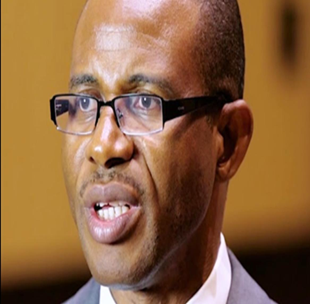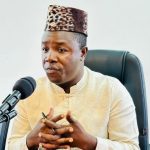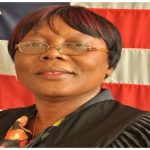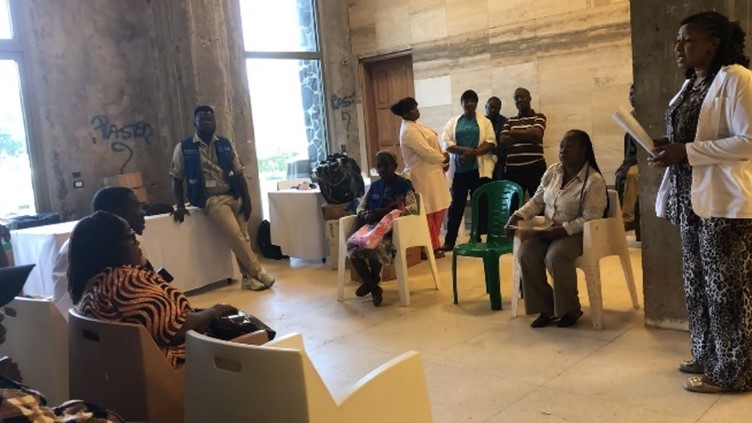By Robin Dopoe, Jr.
Liberia may be on the brink of a looming healthcare cost crisis, but the future is not entirely bleak. While healthcare financing remains a challenge for the government, the country has in one of its sons, Dr. Dougbeh Chris Nyan, a knowledge and expertise that could address the healthcare needs of its growing population, which in a few years will surpass 5.2 million people.
Dr. Nyan, who holds a degree in human medicine (infectious diseases) from Humboldt University, Berlin, Germany, is a biomedical research scientist and an inventor with five patents to his credit, including the Nyan rapid diagnostic test, which can detect three to seven infections, including HIV, Hepatitis B, C, and E, simultaneously in 10 to 40 minutes.
As a scientist, Dr. Nyan is well-positioned to rescue Liberia from its pending healthcare disaster by scientifically integrating traditional medicine into the country’s modern healthcare systems.
This integration can address the healthcare needs of millions of Liberians who struggle daily to access quality healthcare, as the government struggles to meet the country’s healthcare demands, particularly the high costs associated with procuring medicines.
The tight fiscal space means that the Government of Liberia last year only apportioned a modest US$3.8 million, which equates to a mere 9% of the estimated annual requirement of US$41.2 million needed annually for the procurement of medicines.
This situation has forced the government to consider a drug revolving fund to compensate for the gap. In the 2024 fiscal year, US$4.7 million was allocated for drugs and medical consumables, which in essence means the government will have to rely on donor funding to compensate for gaps in the procurement of medicines.
As such, the integration of traditional medicine into the country’s healthcare system would align with the World Health Organization’s (WHO) position, as enshrined in its “Traditional Medicine Strategy,” which significantly emphasizes the use of traditional medicine to complement conventional medicine to achieve “increased healthcare.”
According to Tedros Ghebreyesus, the WHO Director-General, traditional medicine, if scientifically validated, has the potential to bridge the gap in healthcare access for millions around the world.
In a speech last year, Ghebreyesus argued that traditional medicine is “not a thing of the past,” as he highlighted its growing demand, especially for “preventing and treating non-communicable diseases and mental health, and for healthy aging.”
While WHO and countless experts have recognized the medical benefits of traditional medicine, its greatest drawback has been recognition as an alternative or joint source of healthcare to that of standard, conventional medicine due to limited or absent scientific research establishing and documenting its safety.
Additionally, the limited research investigating interactions posed should a patient use both traditional and conventional medicine has contributed to this recognition problem.
This obstacle, however, is remediable — opening the door for Dr. Nyan to begin scientifically exploring the therapeutic effects of Liberian traditional medicine in the human body, as well as its interactions with conventional medicines to determine the safety of their single or combined use.
Dr. Nyan’s scientific acumen and understanding of global clinical research protocols can bridge the gap between Liberia’s traditional knowledge and modern science, validating its safety and efficacy. This would address concerns about dosage and safety, making the integration of traditional medicine into the country’s healthcare systems easier — ushering in an era of increased treatment options and better healthcare.
The reality is, Liberia’s traditional medicine, with its rich history rooted in centuries of indigenous knowledge, has seen its acceptance level diminish due to limited pharmacological studies on its safety, particularly regarding dosage and quality.
This gap has led to broad rejection of Liberia’s traditional medicine by the government and the medical community despite its significant health benefits.
Globally, traditional medicine, which heavily relies on medicinal plants, has played a significant role in developing modern drugs, with approximately 25 percent of modern drugs and up to 60 percent of antitumor drugs derived from natural products.
According to the WHO, nearly 40% of pharmaceutical products today have a natural product basis, and landmark drugs derived from traditional medicine, including aspirin and childhood cancer treatments among others.
However, only 15 percent of the world’s plant species have been evaluated for their pharmacological potential, highlighting the untapped potential of medicinal plants. Liberia is, therefore, no exception, as the country is significantly rich in indigenous medicinal fauna and flora of different species which are traded for medicinal purposes.
This is why, Dr. Nyan, a trained US National Institutes of Health infectious disease scientist, who has worked for the US Food and Drug Administration, ‘MUST’ heed this call and come to the aid of the motherland, which now needs his knowledge utilized in whatever way he can to help the country achieve its goal of Universal Health Coverage as envisioned in its National Health Policy 2022-2031.
Healthcare financing in Liberia is characterized by significant resource gaps and challenges. Total public expenditure on healthcare has dwindled over the years due to declining donor contributions and limited government funding, according to a study by Dr. Mpuma Kamanga released in 2023 on “The Revolving Drug Fund and Cost-sharing Mechanisms.”
For example, the estimated budget for the country’s National Health Strategic Plan 2022-2026 amounts to approximately US$844 million, with the government’s envisaged US$288 million pales in comparison to the US$555 million that must be strategically mobilized to bridge the resource gap over the plan’s timeline.
The scarcity of funds impacts the procurement of essential medicines and the delivery of quality healthcare services, particularly affecting vulnerable households — as household out-of-pocket payments now constitute the largest share (53%) of healthcare financing — while external financing contributes 27%, and domestic government expenditure accounts for 16%, the study shows.
The result has, therefore, been accessibility and affordability challenges, particularly for vulnerable households, with only 37% of health facilities having access to even one essential tracer medicine.
The remedy for the situation, however, can be found in the scientific validation of Liberia’s traditional medicine, which will go a long way in reducing the country’s healthcare burden and reliance on imported generic medicines to treat common illnesses like malaria, typhoid, and arthritis.
Additionally, the economic potential of Dr. Nyan accepting this call and conducting pharmacological studies of Liberia’s traditional medicines would not just set a standard on dosage and quality but open enormous economic potential for the motherland and its citizenry.
Globally, the market for traditional medicine is estimated at US$83 billion, with countries like China and India alone accounting for more than 50 percent of total world trade, having successfully integrated their traditional medicine with modern healthcare, creating a booming industry that contributes billions to their economies as well as employing thousands.
Considering the vast health and economic potential of Liberia’s traditional medicine, it is now time for Dr. Nyan to heed this call, knowing that his grandfather saved the lives of many as a traditional medicine practitioner.
Dr. Nyan’s scientific acumen can make a profound difference, unlocking the untapped potential of Liberia’s traditional medicine sector, thereby creating a future where traditional knowledge and modern science coexist harmoniously as well as creating a thriving industry that generates employment opportunities and bolsters export earnings.
About the author: The author, Robin Dopoe, Jr., is a former Senior Editor of the Daily Observer newspaper, Liberia’s oldest independent daily, and an ambassador of the Liberia Intellectual Property Office.







